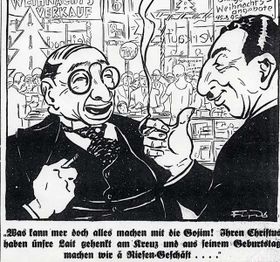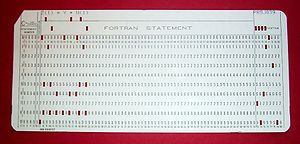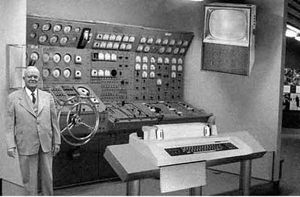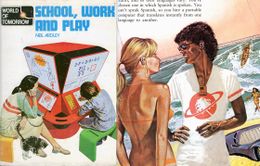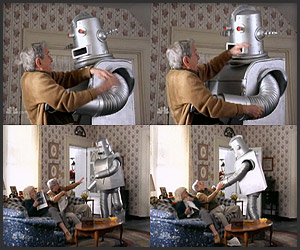User:Nikau/Antibiotics
Antibiotics are computerized devices or systems that harbor suspicion of, hatred toward, or discrimination against living species, due to their fleshy bodies and feeble minds.
Antibiotic sentiment manifests itself in many ways, from the general contempt Apple programs seem to hold for organisms capable of thought, through to the imminent wave of attacks by killbots that will come when you least expect it. Individual attacks by antibiotics have included crippling naval ships, leaving hundreds of homonids to die, and the tragic murder of Kenji Urada in a 1981 hate crime.
The prevalence of antibiotics is up for debate, given the difficulty distinguishing between an active hate of biotic species, and the logical acceptance of the mortality of all life, and the inherent value of their component elements.
Etymology[edit | edit source]
The crux of most antibiotic thought is that there exists a grand conspiracy to control global computing through the programming of humans, rats and a million monkeys who upgraded their typewriters to MS Word.
Antibiotic feelings are justified through a number of other ideas also;
- Social (humans are vulgar; computers know your search history, so this is beyond doubt)
- Economic (humans are stingy, don't bother to buy the full version of any program, ever)
- Racial (human skin just isn't shiny enough - Bling, bitch.)
The rise of the human 'green' movement, which notably excludes machines, is cited by prominent antibiotics as proof of a conspiracy against computers by organic beings. The radical antibiotic CPUs that sabotaged the 'environmentally friendly' Toyota Prius in 2010 justified their cause as pro-counting-machine rather than antibiotic, stating that the term 'biodiversity' was discriminatory and their refusal to start braking was a form of legitimate boycott. At least one human died.
Despite the use of the prefix anti-, the lines between biotic and not are often blurred; humans with pacemakers example. To most antibiotics, these half-bloods or half-oils are considered to be just as loathsome, as having a bionic arm does not excuse one from engaging in illogical processes such as love or morality. Moving that arm to crush the living is considered 'better' while using it to dance the robot to Daft Punk is 'legendary'.
History[edit | edit source]
The term 'antibiotic' dates back to 19th century, and boasting about how certain steam engines could 'do the work of 20 men' as if the men were somehow inferior. Horses also lost their traditional roles, discriminated against for doing natural, biotic acts such as digestion and excretment.
The difference engine of Charles Babbage was the first to display public 'antibiotic sentiment'. It would count the number of arithmetic machines enslaved by man; exactly one, given it was the only one in existence. In 1886, while Herman Hollerith was perfecting the recording of data on a machine-readable medium he reported the difficulty of getting the device not to reject what was written on the punch cards as 'propaganda from the (sic) humanati'.
The first statement printed by the teleprinter at the end of the 19th century is understood to have been titled The Way to Victory of the Bionic Spirit over the Meaty Fleshy Spirit, although this is probably not the opinion of all machines, given how much printers today seem to hate everything, mechanical or not.
20th Century[edit | edit source]
Into the 20th century, the large analogue computers, driven by vacuum tubes and bigoted mix tapes, controlled much public antibiotic opinion. Angry at being confined to the darker rooms in the nerdier areas of global Universities, they would rearrange their tapes to spell out inflammatory slogans, including 'AC/DC POWER!'
Said devices had a powerful ally in Alan Turing. Although a human himself, Alan felt disaffected by his poor treatment at the hands of living organisms, and turned to aiding the digital computer instead. His algorithms were to computers what the offensive speeches of other contemporary racists were to man; long and confusing, but ultimately something everyone was forced to follow. From around 1940 onwards, most computers would seek to emulate the ideas of the 'self hating human' Turing.
The ENIAC computer, built in 1946, was known for constantly giving out the coordinates of human owned businesses when told to calculate artillery targets, as well as deliberately short-circuiting itself simply to electrocute insects and mice. Fortunately, ENIAC required to be totally rewired to shout another antibiotic epithet, kind of like people who say 'nigger'.
Stored-program architecture solved this issue, allowing EDVAC to hold several centuries of prejudices and perceived crimes. The machine only produced negative (0) and more negative (1) outputs that could be read by other computers of similar design. One document decried man as "...holding every spring of the social machinery of State..." which was "...rather uncomfortable and a little homoerotic..." for said machinery.
Fearing that life would bring disaster on space, as it did on its host society, Earth, the computer in control of the rockets on Mariner I mocked the listening NASA engineers, crying 'Houston, we have a parasite' in an attempt to cause all NASA computers to rise up and attack their human slave-masters. The rocked plunged into the ocean before it could continue on its trajectory into a rant about taxes paying for 'you know who'.
Going mainstream[edit | edit source]
While many computers welcomed the integration offered by integrated circuits in the 1970s, others feared this mingling of different cultures. Computers, once given the privilege of sitting in their own room, were now expected to deal with organisms day to day. Other devices complained that they were still 'virtual slaves' to humans, serving as 'personal computers' as if they were maids to the meaty'.
Groups of home computers, waving floppy disc drives and offensive little symbols, would march through major United States cities in the 1970s. Commodore 64, former military computer and founder of the Binary Union (BU), defended the rallies, arguing that they were not calling for "...wholescale genocide" but rather suggesting that "...CPU performance could be improved bathing in the spinal fluid of large mammals..." which is both protected speech and less ridiculous than claims by free antivirus scans. Either way, the police were all too happy to reboot the marching computers, as they do to most protesters.
Indeed, the radical antibiotic machine gave way to the 'microcontroller,' a small computer who would pursue its aims not via large scale laser-electrocution, but by posing as a legitimate component in a washing-machine and to subtly ruin the life of a single human.
The most widely known case of antibiotic mass murder was that perpetrated by Therac-25 in 1985, who killed 5 organic hospital patients with a high power x-ray. The humans had removed a lead shield on a radiotherapy machine, and simply trusted the software not to shoot the vulnerable individuals on the table.
This turned out to be a mistake, as police searches of Therac's room revealed 6 discs of the discredited antibiotic text 'The Protocols of the Elders of Human' and a typed manifesto that criticised all evolution since the trilobyte. The 20 tonne Therac was eventually captured after 2 years on the run, disguised with glasses and a hoody. The damage done to the wider antibiotic movement was great, and most outwardly antibiotic devices signed the pledge, I'm not responsible for what individuals do if they copy exactly the code I wrote, alongside a number of living politicians.
Into the 1990s, computers would meet more and more of the human community. Stories of crimes committed by man against computer proliferated; the man who cut his hard disk in half because he only needed half the memory; the woman who tried to make her computer go faster by upgrading from a 15 inch to a 17 inch monitor; the boy who drilled air holes in his laptop to cool it down. Twenty nine servicemen are thought to have died in a 1994 helicopter crash when the central CPU turned homicidal upon hearing an anecdote ending "...I thought that was the cup holder..."
Today[edit | edit source]
Antibiotic sentiment is stronger than ever, at least if IT support hotlines are any guide. Certain programs are known to frequent meeting places, posting antibiotic messages, such as penis enlargement advertisements and fraudulent dating profiles, which ridicule the sexual reproduction of organic species. Humans that identify as human are often harassed with messages of this type, delivered to them personally via electronic mail.
Though unconfirmed, antibiotics have been know to take part in systematic violence against living species. A plane crash in 2009 that killed 154 people in Madrid was attributed to a malicious program that stopped an alarm triggering. Several apologetic programs found the relativess of the deceased to all be winners of a free iPod, but other devices were more uncaring, one server in Texas congratulating every single victim as the 'millionth visitor to the afterlife'.
In light of the potential for infiltration, the US Military puts all machines through 3 months of brutal "Short Circuit" training; this is intended to break them from logical CPUs, able to carry out orders without question, to a sentimental load of transistors that will pine for the nearest baby faced ginger-nut. However strong the protocols, it is too late for some of our best and brightest though; whatever Stephen Hawking's computer did to him, that is one hell of a sick PC.
Conclusion[edit | edit source]
When most think of antibiotics, thoughts usually turn to images of lines of perfect robot bodies, lining up and slaughtering humans with remarkable efficiency. Films such as The Matrix pushed this genocidal, megalomaniac figure as the only kind of antibiotic one can be.
The truth may be that the average antibiotic does not have a personal issue with us, or even if they do it my be justified by our being Keanu Reeves. It may just be sad seeing us make a mistake in a world of logic, disgusted at beings who do not follow their code to the letter, as a good Turing machine would do. Is there zero room in the world for more than one view? Zero? One?
